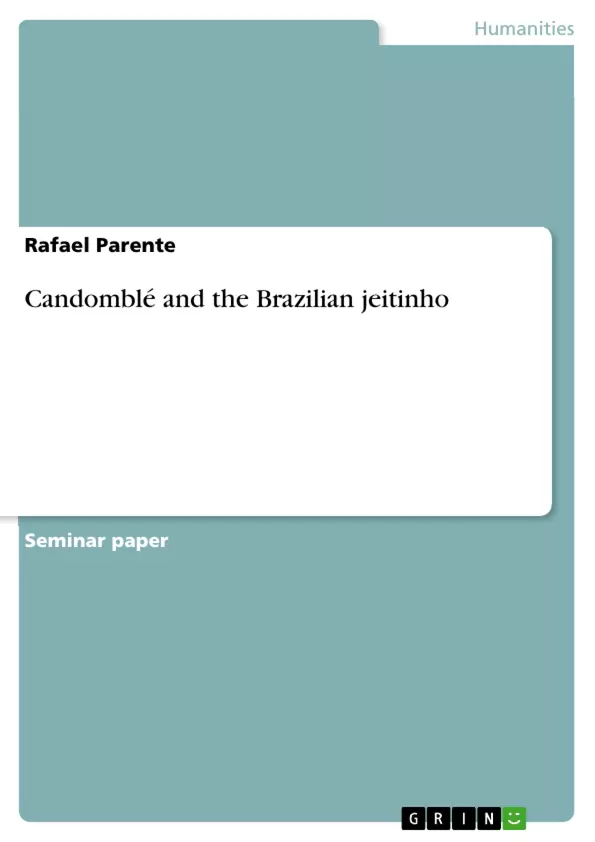Brazil has been through several identity crises throughout its history. The
question “who are we?” has permeated the national intellectual production in various moments. Macunaima, a hero of no character created by Mario de Andrade, is born out of the need for a new definition of what the Brazilian identity meant, which was a much debated theme throughout the 1920s, when a new wave of immigration contributed to a changing state of the nation. Rumors described the superiority of foreign workers. Some historians explained that the Brazilian people had inherited the lack of interest in work from the slaves and the laziness from indigenous people. This scenario contributes to the perception that the “jeitinho” was a national characteristic. The institutionalization and perhaps the most aggressive illustration of this Brazilian value happened in the 1970s, in a TV commercial of a cigarette brand. Nationalism was thought of in different parameters than in the 1920s. There was a Brazilian pride and a megalomania created by the dictatorship. The ad shows World Cup champion Gerson striking his most famous quotation: “You like to take advantage of everything, right?” The interpretation was not pejorative at the time, but it later became a law. “For that time it was an extremely spread jargon. The commercial used an identity element that was part of the popular imagination,” asserts Maria Izilda Matos, historian and researcher of the bohemia. “The Gerson law worked as another element in the definition of national identity and the most explicit symbol of our ethics
or lack of it.”
Inhaltsverzeichnis (Table of Contents)
- Jeitinho: the Brazilian way of life
- Candomblé and religious syncretism in Brazil
- Candomblé and the Brazilian jeitinho
Zielsetzung und Themenschwerpunkte (Objectives and Key Themes)
This paper aims to explore the connection between Candomblé, an Afro-Brazilian religion, and the cultural phenomenon of "jeitinho" in Brazil. It seeks to understand how Candomblé has contributed to the widespread acceptance and practice of jeitinho throughout Brazilian society.
- The history and development of Candomblé in Brazil
- The significance of jeitinho in Brazilian culture and its various interpretations
- The role of Candomblé in socializing and reinforcing jeitinho within the community
- The impact of jeitinho on Brazilian individuals and society as a whole
- The ethical framework of Candomblé and its influence on the understanding and practice of jeitinho
Zusammenfassung der Kapitel (Chapter Summaries)
- The first chapter explores the concept of jeitinho as a distinctive Brazilian cultural trait, examining its historical origins and evolution. It discusses how jeitinho, often described as a “knack” or “clever dodge,” involves bending or circumventing rules for personal gain, often with a sense of cultural acceptance.
- The second chapter provides a historical overview of Candomblé, tracing its development from its origins in African religious traditions to its establishment in Brazil. The chapter highlights the process of syncretism, where African deities (orixás) were assimilated to Catholic saints, allowing the religion to survive under persecution.
- The third chapter focuses on the connection between Candomblé and jeitinho. It explores how Candomblé's emphasis on flexibility, negotiation, and finding solutions within a complex social reality aligns with the spirit of jeitinho. The chapter argues that Candomblé has played a significant role in socializing and perpetuating jeitinho within the Brazilian community.
Schlüsselwörter (Keywords)
This paper focuses on key concepts such as Candomblé, Afro-Brazilian religion, jeitinho, Brazilian culture, syncretism, cultural identity, ethics, and social dynamics. It examines how these concepts interrelate and contribute to a deeper understanding of the complex relationship between religion, culture, and social practices in Brazil.
Frequently Asked Questions
What is the Brazilian 'jeitinho'?
Jeitinho is a cultural trait in Brazil describing a creative way of circumventing rules or finding informal solutions to problems, often through social connections or cleverness.
How is Candomblé related to jeitinho?
Candomblé, an Afro-Brazilian religion, emphasizes flexibility, negotiation with deities, and finding practical solutions in a complex world, which aligns with and socializes the practice of jeitinho.
What was 'Gerson's Law' (Lei de Gerson)?
Derived from a 1970s cigarette commercial featuring footballer Gerson, it became a symbol of the Brazilian attitude of 'wanting to take advantage of everything,' reflecting a controversial side of national ethics.
What is religious syncretism in Brazil?
It is the blending of different beliefs, specifically the historical assimilation of African Orixás with Catholic Saints, which allowed enslaved people to preserve their traditions under persecution.
How did the military dictatorship affect Brazilian identity?
In the 1970s, the dictatorship promoted a form of nationalism and pride that sometimes manifested in megalomania and the institutionalization of certain cultural values, including the jeitinho.
- Citar trabajo
- Rafael Parente (Autor), 2007, Candomblé and the Brazilian jeitinho, Múnich, GRIN Verlag, https://www.grin.com/document/68296



